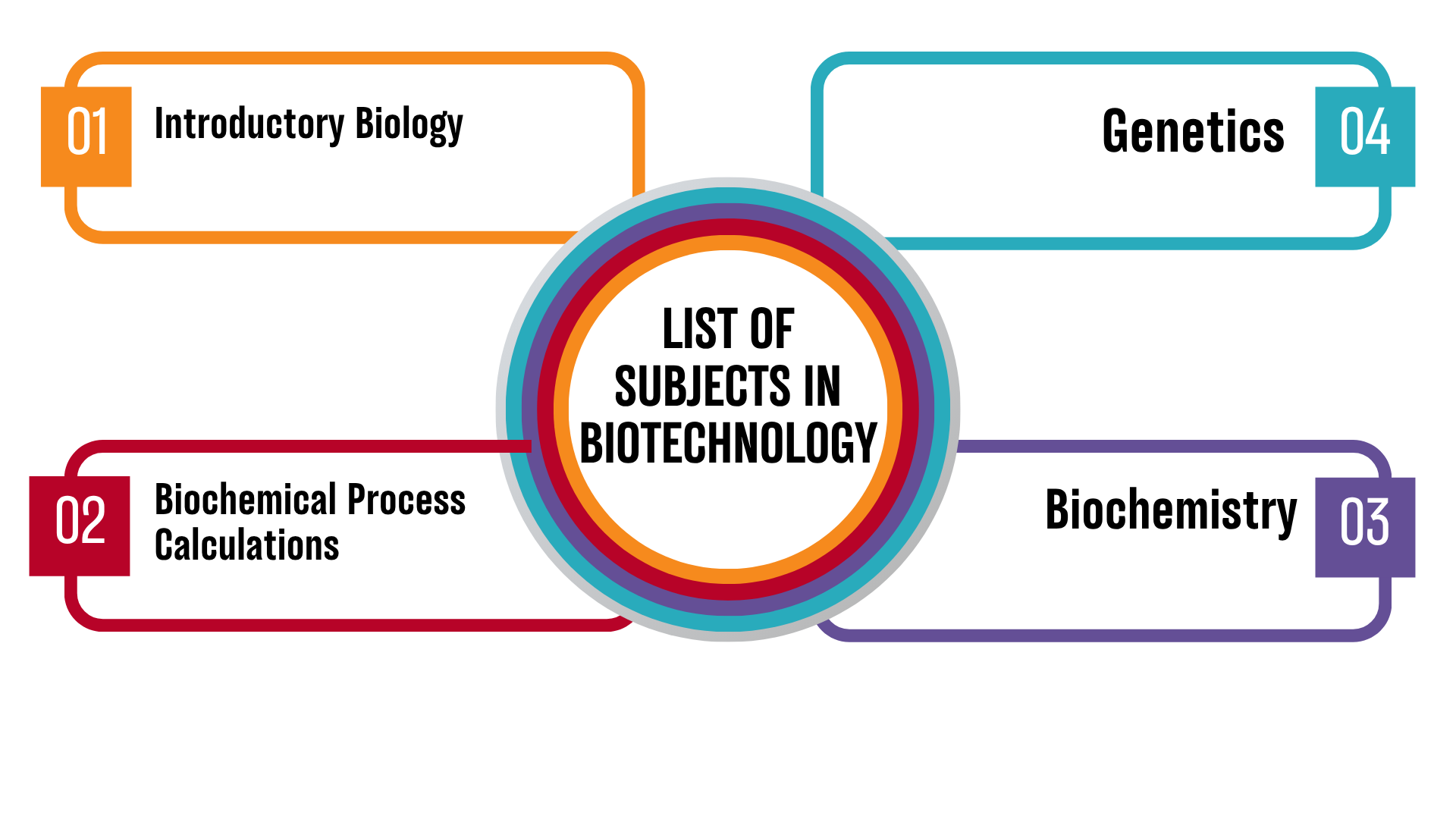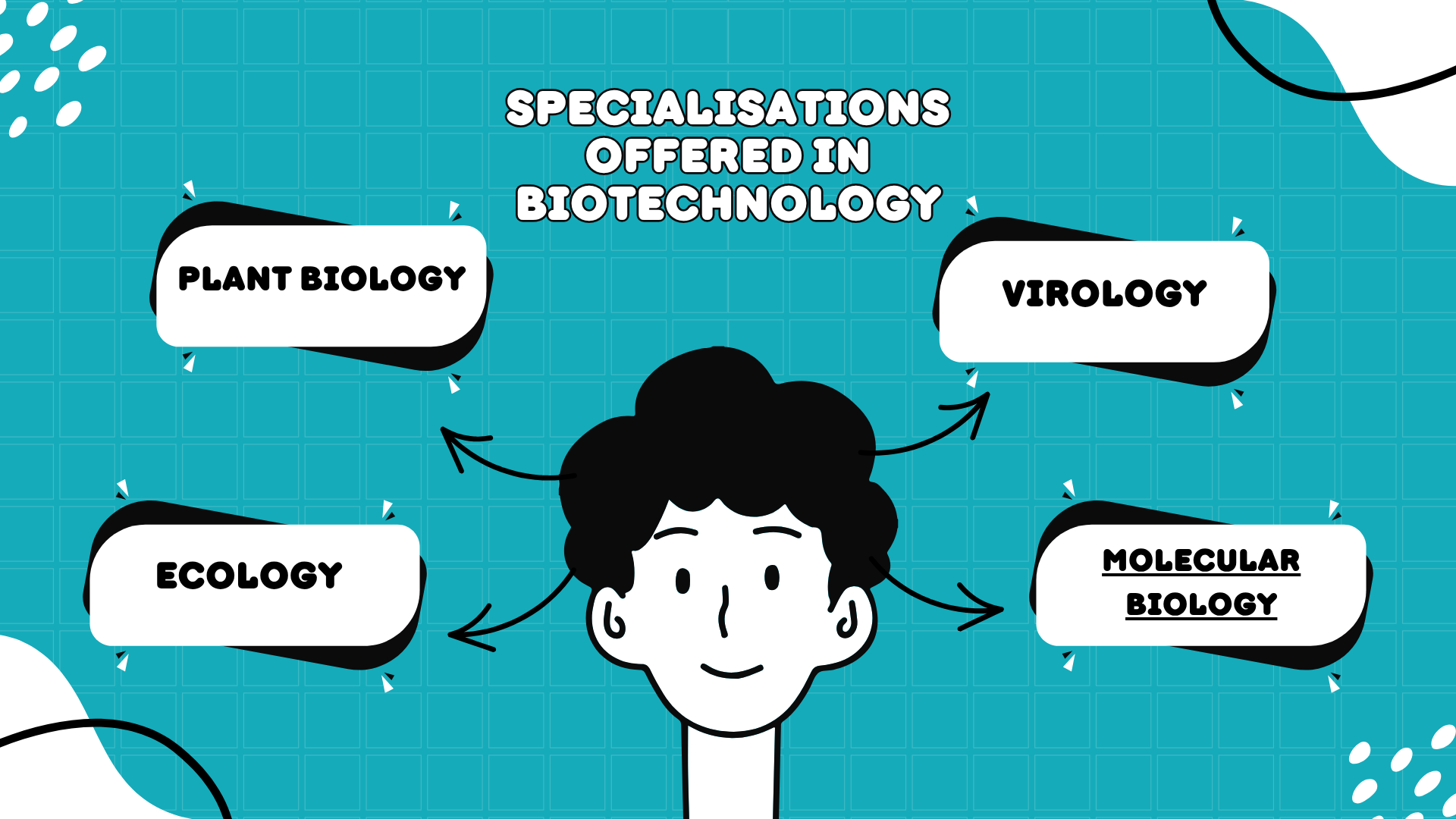Biotechnology Subjects List 2025: Biotechnology is a highly interdisciplinary and vast field, firmly rooted in the principles of biology, dedicated to leveraging living systems and organisms to create products that improve human life and the environment. Due of its broad scope, which includes chances in healthcare, agriculture, food science, and environmental protection, it draws a lot of students. This field is available to aspiring professionals at several academic levels, including as undergraduate (B.Sc. or B.Tech.), certificate, certification, and postgraduate programs.
The B.Sc. and B.Tech. in Biotechnology are the most sought-after undergraduate degrees; these programs are usually available to students who have taken Physics, Chemistry, and Biology (PCB) or even Physics, Chemistry, Mathematics, and Biology (PCMB) in higher secondary school. Through their mastery of biological processes, biotechnology specialists propel innovation, producing anything from pest-resistant crops to life-saving medications and sophisticated diagnostics, guaranteeing a steady demand for qualified graduates in this forward-thinking sector.
List of Subjects in Biotechnology

Life sciences, engineering, and physical sciences are all combined in biotechnology. Genetics (knowing heredity and disease pathways), Biochemistry (studying plant/animal metabolism for drug discovery and crop improvement), Biochemical Process Calculations (concentrating on material/energy balances for industrial processes), and Introductory Biology (covering evolution, DNA, and life systems) are important subjects.
| Subject title | Subject details |
| Introductory Biology | The syllabus of this subject is a unification of life sciences, engineering, and physical sciences. Students understand the basic principles of Biology and develop new solutions using engineering for the environment, industry, and other fields. The objective of this subject is to provide the basic knowledge of biological sciences and study its applications.
Some parts of the syllabus are:
|
| Biochemical Process Calculations | Through this subject, students learn the basic principles of energy and material balances that are required in biochemical engineering. The main focus of this course is on solving the material or energy balances for selected unit operations and processes that are available in the biotechnology industry. You can establish the mathematical methodologies that help in computation in biochemical engineering. You can also get an overview of the industrial biochemical processes.
Some parts of the syllabus are:
|
| Genetics | The subject helps in understanding classical, modern, and quantitative genetics. You will learn the rate at which the members of a population are likely to develop a particular disease. Accordingly, you will be able to manage the risks. Understanding developmental pathways will help you know the genetic causes behind the disease.
Some parts of the syllabus are:
|
| Biochemistry | This subject helps in understanding many processes in plants and animals. It helps in crop improvement and drug discovery. Students are introduced to the basic concepts of Biochemistry and metabolism in plants and animals.
Some parts of the syllabus are:
|
Biotechnology: Detailed Syllabus
This curriculum explores biotechnology through a variety of areas. Students learn cell biology (including cancer, division, and structure) and microbiology. Among the fundamental subjects are bioinformatics (managing biological data and protein databases), immunology (vaccines and antibodies), and bioreactor analysis (industrial reactor design). Environmental Biotechnology (microbial techniques for environmental issues), Enzyme Engineering (molecular catalysis), and Food Technology are all covered in advanced courses.
Also Check:
-
IPMAT Indore 2026 Exam Date Announced: Check Eligibility, Registration, and Important Dates Here
-
BSc Subjects List & Syllabus 2025: Download Semester-Wise Syllabus for All Streams
-
MBA Syllabus 2025: Semester-Wise Subjects, Specializations, and Course Structure
-
Scored 450 marks in NEET 2025? Top Colleges in India for MBBS
-
BBA 1st Year Subjects 2025: Semester-Wise Subjects List & Syllabus
-
DAAD Scholarship 2025: Eligibility, Application and Registration Details Here
-
Top 10 Largest Colleges in Ahmedabad 2025: Courses, Eligibility & Admissions
-
Chevening Scholarship 2026: Eligibility, Benefits, Application Process & Important Detai
Specialisations offered in Biotechnology

We use the term "biotechnology" to refer to a broad range of subjects, including chemistry, microbiology, engineering, genetics, and biochemistry. Agriculture, animal husbandry, pollution management, energy production and conservation, disease research, eco-conservation, vaccinations, pesticides, pharmaceutical development, and fertilizers are just a few of the businesses that have benefited greatly from this study.
| Specialisation | Subjects | Details |
| Plant Biology |
| Students interested in plant biotechnology often choose this Specialisations. You will be studying plant life and applying technical methods to living organisms and the environment. |
| Virology |
| Specialisations in Virology allows students to learn in detail about human viral diseases, the definition and evolution of viruses, and the mechanism of viruses. Upon completion, students get involved in the research of viruses and the diseases related to them. |
| Ecology |
| The Specialisations offers a deep insight into the relationships among various organisms. It talks about the mutual influence of the environment in which organisms are living and the organisms themselves. |
Also Read:
Top IIT Colleges That Offer Data Science Courses to Learn Online in 2025
Best Free AI Courses for Beginners in 2025
Best Pharmacy Colleges in India 2025 After 12th Offering High Job Placement
To stay updated on current trends, join the Jagran Josh Telegram Community!
